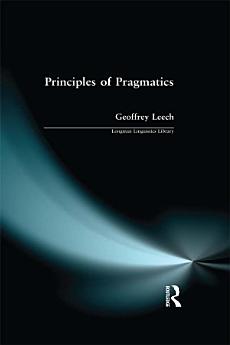Principles of Pragmatics
ফেব্ৰু ২০১৬ · Routledge
ইবুক
264
পৃষ্ঠা
family_home
যোগ্য
info
reportমূল্যাংকন আৰু পৰ্যালোচনা সত্যাপন কৰা হোৱা নাই অধিক জানক
এই ইবুকখনৰ বিষয়ে
Over the years, pragmatics - the study of the use and meaning of utterances to their situations - has become a more and more important branch of linguistics, as the inadequacies of a purely formalist, abstract approach to the study of language have become more evident. This book presents a rhetorical model of pragmatics: that is, a model which studies linguistic communication in terms of communicative goals and principles of 'good communicative behaviour'. In this respect, Geoffrey Leech argues for a rapprochement between linguistics and the traditional discipline of rhetoric. He does not reject the Chomskvan revolution of linguistics, but rather maintains that the language system in the abstract - i.e. the 'grammar' broadly in Chomsky's sense - must be studied in relation to a fully developed theory of language use. There is therefore a division of labour between grammar and rhetoric, or (in the study of meaning) between semantics and pragmatics. The book's main focus is thus on the development of a model of pragmatics within an overall functional model of language. In this it builds on the speech avct theory of Austin and Searle, and the theory of conversational implicature of Grice, but at the same time enlarges pragmatics to include politeness, irony, phatic communion, and other social principles of linguistic behaviour.
লিখকৰ বিষয়ে
Geoffrey Leech was Professor of Linguistics and Modern English Language at Lancaster University from 1974 to 1996. He then became Research Professor in English Linguistics. He has been Emeritus Professor in the Department of Linguistics and Modern English Language, Lancaster University, since 2002.He has written, co-authored or co-edited 25 books in the areas of English grammar, literary stylistics, semantics, computational linguistics, corpus linguistics and pragmatics. They include:"English in Advertising: A Linguistic Study of Advertising in Great Britain" (1966); "A Linguistic Guide to English Poetry" (1969); "Meaning and the English Verb "(1971, 2nd ed. 1987, 3rd ed. in preparation); "A Communicative Grammar of English "(with J. Svartvik) (1975, 2nd edn. 1994, 3rd edn. 2002); "Style in Fiction: A Linguistic Introduction to English Fictional Prose" (with M. Short) (1981); "Principles of Pragmatics" (1983); "A Comprehensive Grammar of the English Language "(with R. Quirk, S. Greenbaum and J. Svartvik) (1985); "Spoken English on Computer: Transcription, Mark-up and Application" (ed. with G. Myers and J. Thomas) (1995); "Corpus Annotation: Linguistic Information from Computer Text Corpora" (ed. with R. Garside and T. McEnery) (1997); "Longman Grammar of Spoken and Written English" (with D. Biber, S. Johansson, S. Conrad and E. Finegan) (1999); "Word Frequencies in Written and Spoken English: based on the British National Corpus "(with P. Rayson and A. Wilson) (2001); "Longman Student Grammar of Spoken and Written English "(with D. Biber and S. Conrad) (2002)
এই ইবুকখনক মূল্যাংকন কৰক
আমাক আপোনাৰ মতামত জনাওক।
পঢ়াৰ নির্দেশাৱলী
স্মাৰ্টফ’ন আৰু টেবলেট
Android আৰু iPad/iPhoneৰ বাবে Google Play Books এপটো ইনষ্টল কৰক। ই স্বয়ংক্রিয়ভাৱে আপোনাৰ একাউণ্টৰ সৈতে ছিংক হয় আৰু আপুনি য'তে নাথাকক ত'তেই কোনো অডিঅ'বুক অনলাইন বা অফলাইনত শুনিবলৈ সুবিধা দিয়ে।
লেপটপ আৰু কম্পিউটাৰ
আপুনি কম্পিউটাৰৰ ৱেব ব্রাউজাৰ ব্যৱহাৰ কৰি Google Playত কিনা অডিঅ'বুকসমূহ শুনিব পাৰে।
ই-ৰীডাৰ আৰু অন্য ডিভাইচ
Kobo eReadersৰ দৰে ই-চিয়াঁহীৰ ডিভাইচসমূহত পঢ়িবলৈ, আপুনি এটা ফাইল ডাউনল’ড কৰি সেইটো আপোনাৰ ডিভাইচলৈ স্থানান্তৰণ কৰিব লাগিব। সমৰ্থিত ই-ৰিডাৰলৈ ফাইলটো কেনেকৈ স্থানান্তৰ কৰিব জানিবলৈ সহায় কেন্দ্ৰত থকা সবিশেষ নিৰ্দেশাৱলী চাওক।








